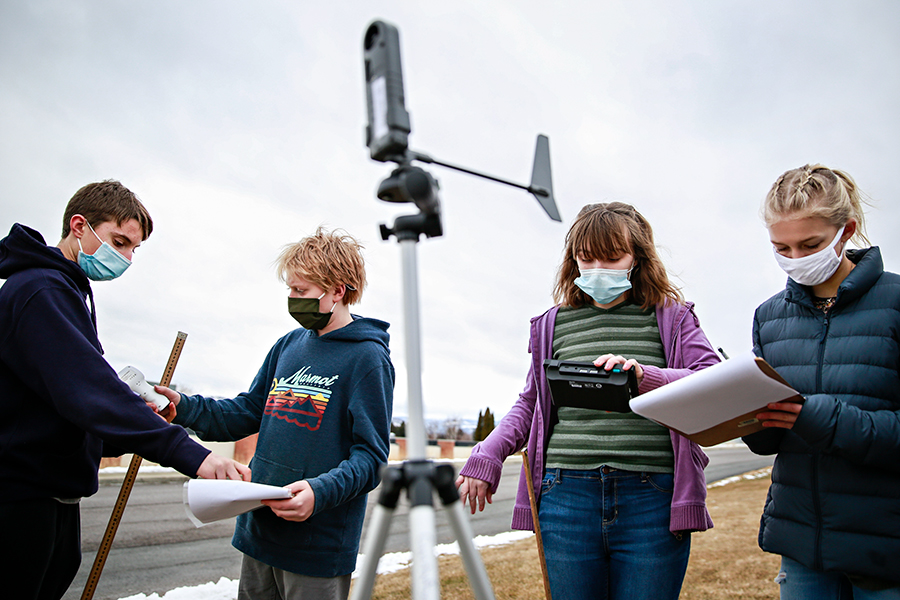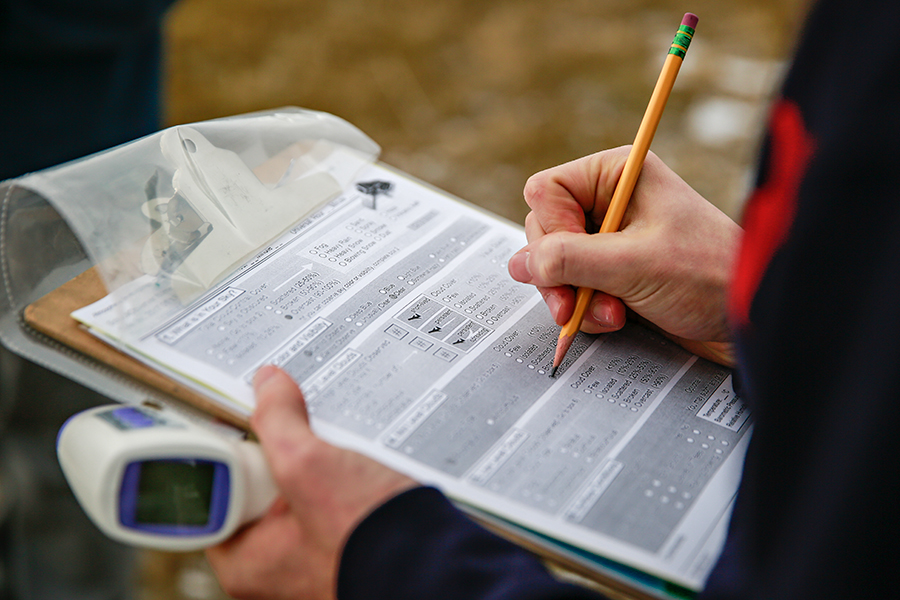Nonprofit Provides Grants to Implement Unique Programs in Kalispell Schools
Kalispell Education Foundation recently hired part-time executive director, supports schools through targeted classroom-based innovation grants
By Myers Reece
It’s not every day that you get to collect atmospheric and water-quality data to be entered into an international database and utilized by NASA.
Unless you go to Kalispell Middle School.
Science teacher Annie Gustafson oversees an extracurricular program at KMS called GLOBE, in which seventh- and eight-graders learn science through hands-on research outside of the classroom setting and contribute meaningful data as citizen scientists. GLOBE is an international science and education program that stands for Global Learning and Observations to Benefit the Environment.
“While from 8-3, I’m mostly confined to teaching within the walls of my classroom, our real classroom should be the lands that surround the Flathead Valley,” Gustafson said. “I’m hoping that by teaching students through this hands-on approach of collecting water quality and atmospheric data, that they will gain an appreciation for why this place is so special.”
“Learning what limiting factors of our local ecosystem are, by actually measuring them,” she continued, “and then in turn contributing to science on a global scale by sharing our data internationally, is really what science is all about.”
On a recent chilly Thursday afternoon, the GLOBE students trundled out the KMS school doors armed with portable weather stations. Setting up in two separate spots on the school lawn, they plugged handheld devices into the stations and collected atmospheric data such as temperature, air pressure and humidity.

The program couldn’t exist without equipment such as the weather stations, and the equipment wouldn’t exist at the school without a $2,114 grant through the Kalispell Education Foundation, whose mission is to provide “grant-based investment in programs and resources that encourage collaboration, innovation, and academic excellence.”
“We aim to enrich the quality of education for students in Kalispell Public Schools with community involvement and investment,” the foundation states, adding that it’s “dedicated to working with the Kalispell School District to fund current and emerging needs.”
GLOBE is one of six proposals to receive funds in the latest round of grants from the foundation. The proposals are written and submitted by teachers, like Gustafson, who want to implement a unique idea in the classroom for which funding isn’t available in the regular school budget. The foundation, a nonprofit that is independent of the school district, can provide that bridge funding.
Among the other six grant recipients was the Brewing a Bright Future program, which gives special education students “real world and employable skills by employing the use of an espresso machine and grinder” at the Glacier High School coffee stand, according to a synopsis on the foundation’s website.
Others include: Glacier High’s Ascent program, which addresses adolescent struggles by focusing on growth through maturity; Glacier’s Algae Alive!, which gives students inquiry-based lab experiences in the classroom or at home, incorporating experiments with algae balls and self-sustaining algae ecosystems; Peterson Elementary’s Cameras Capture Student Voices program, which funds digital cameras for students to “express themselves through photography and create engaging videos for our school community;” and Kalispell Middle School’s Multifunctional Stream Table, which creates a “space that offers specialized and diversified instruction.”
Since the foundation was established in 2009, it has distributed 97 grants worth a total of $118,255 at an average of $1,110 per grant, an amount that goes a long way in implementing a targeted concept in a classroom.

The foundation is volunteer driven, but it hired a part-time executive director, Dorothy Drury, in late 2020. Drury said the foundation in the past has been able to support only about half of the grant proposals it receives, and the hope is that committing a staff member to furthering the foundation’s mission and fundraising ability will increase that number. The goal is to raise $20,000 for the fall cycle of grants.
“Across the country, these small classroom-based innovation grants are where many education foundations start and throughout their growth maintain opportunities for teachers to take action in their classrooms,” Drury said. “The programs are so incredible, and we’re looking forward to being able to support more of them in the future.”
At KMS, Gustafson notes that her GLOBE students willingly show up after regular school hours to participate and were particularly excited to collect water-quality data at Lawrence Park this week. Gustafson hopes program participants will eventually be able to take advantage of the equipment’s portability by collecting data in wilderness locations. To start, she wants to hold a summer research trip in Glacier Park this summer.
Gustafson said students will also have the opportunity to travel to an international GLOBE science symposium, although the pandemic has rendered that possibility moot for the time being. When she ran the GLOBE program while teaching in Hot Springs, she said students went to Ireland for the event.
“It was amazing: students from Hot Springs, Montana meeting kids from all over the world,” she said. “As an adult, it was one of the most incredible things I’ve ever done.”
Drury said community support for schools is especially critical during the pandemic.
“Our teachers and our schools have worked so hard and adapted so quickly to this situation because they know it’s not optional to take time to figure things out — they’re just doing it,” she said. “I hope as a community we can rise up and give them the support that they need.”
For more information, including how to donate, visit kalispelleducationfoundation.org.